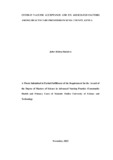COVID-19 VACCINE ACCEPTANCE AND ITS ASSOCIATED FACTORS AMONG HEALTH CARE PROVIDERS IN BUSIA COUNTY, KENYA
Abstract
The novel coronavirus was announced a global rampant disease in March 2020. Non
-pharmaceutical Interventions were imposed globally to assist in controlling the
spread of the disease, which a lot of damage that impacted the health of individuals
and contributed to a significant decline in the global economy. Through rigorous
research, the world realized the development of effective and safe vaccines. The
general public acceptance for vaccination against COVID-19 disease still remains
undetermined. Health care providers have the highest susceptibility to the Corona
Virus disease as they manage multiple patients on their day-to-day activities. They are
integral in the acceptance of any vaccine as they instill confidence to the public in any
vaccination activity. The study aimed to assess the COVID-19 vaccine acceptance and
its associated factors among health care providers in Busia County, Kenya. A sample
size of 423 health care providers was determined using the fisher’s formula, facts were
gathered using an online questionnaire whose questions were both closed and open
ended. Collected data was then transferred into Microsoft Excel Spreadsheet,
uploaded and was put into codes into the SPSS version 26 software for analysis and
final evaluation. Simple descriptive analyses, like frequencies, mean, standard
deviation, and percentages, graphs and figures were formulated for Sociodemographic
aspects, the knowledge scores concerning COVID-19 vaccine, and the
perceived susceptibility, benefits and barriers to the COVID-19 vaccine. Bivariate
correlation was used to ascertain interdependence between variables. Where the Pvalue
of <0.05 was used determined if it was statistically significant or not. The study
found that 93.4% of all sampled health care providers accepted the to the COVID -19
vaccine. Independent variables including age, marital status living arrangements, type
of employer and cadre were significantly associated with vaccine acceptance (p≤0.05).
Health care providers who had been in contact with COVID-19 patients had higher
odds of accepting the Vaccine (OR: 4.4; 95% CI: 2.3 – 8.4; p < 0.0001). Although not
statistically significant, those with chronic medical conditions (86.4%) were less likely
to accept the vaccine than those without (95.2%).There was significant association
between healthcare providers who affirmed radio/TV (OR: 3.1; 95% CI: 1.6 – 5.9; p
= 0.0003), government agencies (OR: 5.6; 95% CI: 2.8 – 11.0; p < 0.0001), healthcare
providers (OR: 8.0; 95% CI: 4.0 – 15.7; p < 0.0001), print media (OR: 4.1; 95% CI:
1.9 – 8.8; p = 0.0001) very significantly influenced their opinion regarding vaccination
and acceptance of COVID-19 vaccines with higher odds reported for each information
source. Health providers who perceived themselves as susceptible were almost 10
times more likely to have accepted vaccines (OR: 9.8; 95% CI: 4.8 – 19.8; p < 0.0001).
Similarly, those who were very worried were about 5 times more likely to have
accepted vaccines compared to those who were not worried (OR: 4.7; 95% CI: 2.2 –
10.1; p < 0.0001) concerns over vaccine safety and interventions to address health care
providers concerns should be put in place taking into consideration the age, sex health
care provider category, with hybrid interventions put in place to strengthen public
education and address concerns about vaccine safety. Further studies are also
suggested to be undertaken on vaccine safety and perception on susceptibility towards
the disease as there is scanty information regarding the same.

